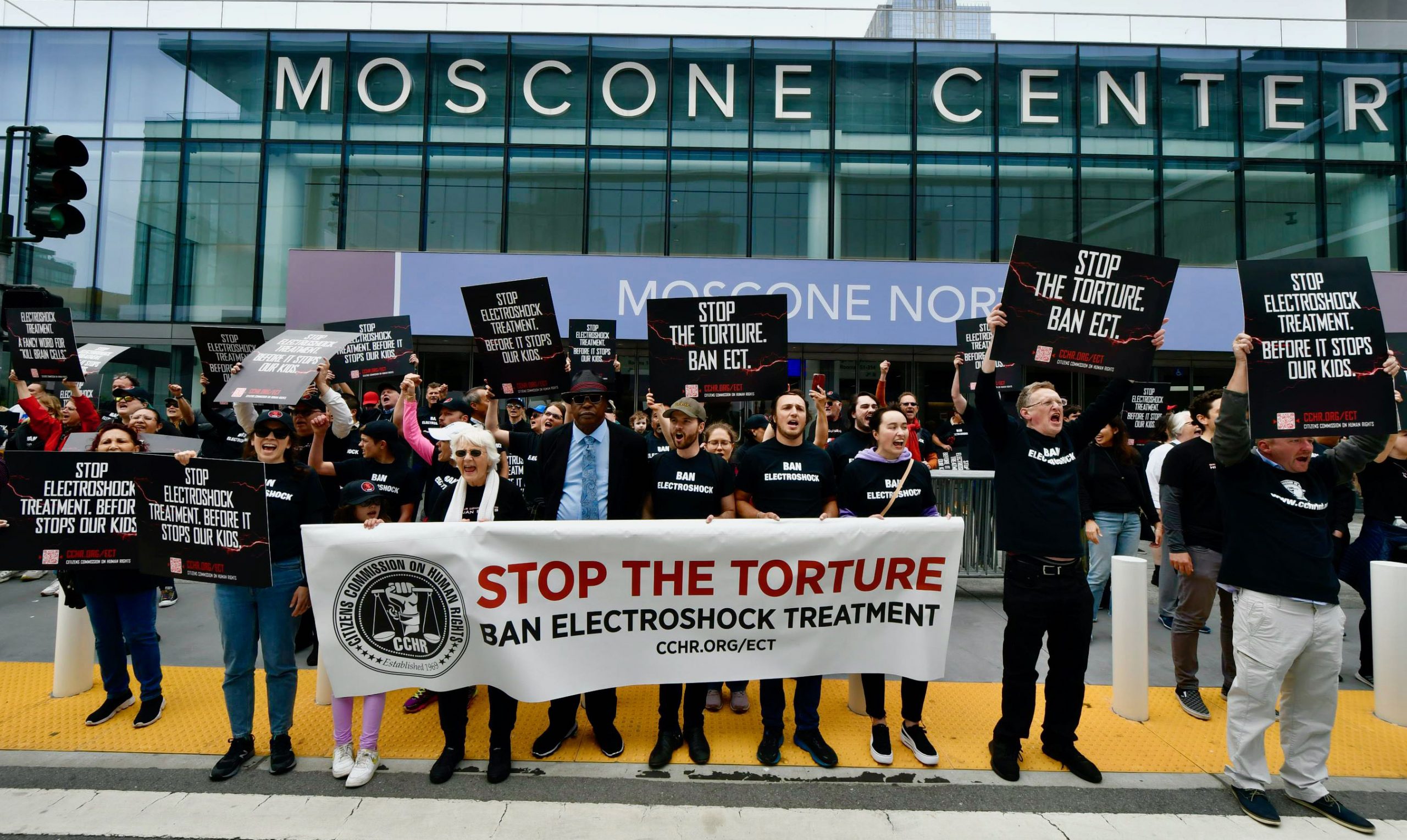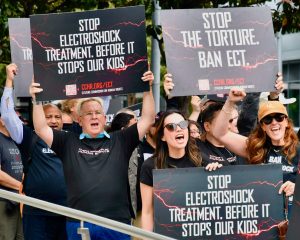CCHR protestors demanded American Psychiatric Association convention attendees support a ban on electroshock given to 100,000 Americans, including 5-year-olds. CCHR draws on international reports condemning forced electroshock treatment as torture.
By CCHR International
The Mental Health Industry Watchdog
May 22, 2023
San Francisco, California: Hundreds protested outside the American Psychiatric Association (APA) convention in San Francisco on the weekend over its ongoing support for the electroshocking of some 100,000 Americans, including children as young as five. The protest was organized by the Citizens Commission on Human Rights, a mental health industry watchdog that helped get electroshock treatment prohibited for use in minors in California in 1976.[1] California bans electroshock, also known as electroconvulsive therapy (ECT), for those younger than 12.[2] In Texas, it is banned for those younger than 16. But CCHR says the practice of inducing a grand mal seizure in individuals through hundreds of volts of electricity through the brain is so draconian and torturous it should be universally banned.
Recently, Members of the United Kingdom Parliament called for a complete ban on the practice.[3] CCHR was instrumental in obtaining legislation in several states of Australia that bans an ECT procedure combined with deep sedation that was so dangerous for all ages that criminal penalties were added to laws as a warning if administered.
In the U.S., many states allow for involuntary ECT, despite the United Nations Convention against Torture condemning the practice. The U.S. is a signatory to the convention, and, as such, it is applicable in domestic law. A July 2018 UN Human Rights Council report indicated that forced ECT constitutes “torture or other cruel, inhuman or degrading treatment or punishment….”[4] In 2021, the World Health Organization also issued mental health guidelines recognizing the need for a ban on forced treatment.[5]
It is virtually impossible to know how many Americans are involuntarily shocked, since, besides Texas, states don’t require hospitals to report how often they administer it against a patient’s wishes.
Jan Eastgate, President of CCHR International, shares insights from a government inquiry where she testified. The judge in the hearing concluded that subjecting individuals to electroshock therapy without their consent is a clear act of assault.[6] “It is astounding that the APA still endorses forced electroshock—indeed, any electroshock—including to children, pregnant women and frail elderly, knowing legally it can constitute assault and violates the Convention against Torture,” Eastgate says.
A study published in the Journal of ECT in December 2020 reported that of 62,602 patients receiving electroshock in California, Illinois, and Vermont, overall 62.3% were women and more than 30% were 65 or older—indicating the brutal treatment is used to target women and the elderly, according to CCHR.[7]
CCHR produced a compelling documentary, Therapy or Torture: The Truth About Electroshock that warns consumers about ECT’s serious risks.
Despite the APA’s claim that only 0.5 percent (1 in 200) of electroshock patients suffer memory loss, statistics from California show that the actual figure is 40 times that amount.[8]
A Los Angeles law firm that has successfully litigated ECT civil cases, reports: “ECT can cause brain damage, permanent memory loss and neurocognitive injury,” “there are no long-term studies that show ECT is safe or effective” and “the procedure continues to deliver a significant amount of electricity to the human brain, resulting in damage.”[9] In 2018, as the result of a class-action lawsuit, ECT device maker Somatics added a warning to its instruction manual that “patients may experience…permanent brain damage.”[10] Yet, the APA has recommended that brain damage be removed from the ECT consent form.[11]
According to CCHR, patients may be at risk of falling victim to consumer fraud if they are advised that ECT can prevent suicide. A recent study published in Acta Psychiatrica Scandinavica determined that after receiving electroshock, patients were 44 times more likely to die by suicide than people in the general population.[12] Another study published in the Journal of Clinical Psychiatry in 2022 also found electroshock does not decrease the risk of death by suicide.[13]
Eastgate said the protest was to raise the bar on why ECT needs to be outlawed, given international agency calls to prohibit all forced psychiatric hospitalization and treatment.
The APA’s convention program includes a “clinical update” on ECT in adult and pediatric patients.
More than 162,000 people in the U.S. have supported petitions calling for a ban on ECT. It encourages people to sign its petition to ban ECT. California went from having 52 facilities in 2008 delivering ECT to 38 in 2017—and needs to take it to zero, CCHR says.[14]
With psychiatrists from around the world attending the APA convention being held in San Francisco, CCHR International says there is an urgent need for them to be put on notice to ban the use of electroshock torture globally, as over 1.4 million worldwide are subjected to the outmoded and dangerous practice. Criminal penalties should be implemented worldwide if ECT is used.

[1] https://www.cchrint.org/2022/01/24/u-s-states-still-electroshocking-0-5-year-olds/
[2] James Luccarelli, MD, Dphil, et al., “Demographics of patients receiving electroconvulsive therapy based on state-mandated reporting data,” Journ. ECT, 1 Dec. 2020.
[3] https://www.cchrint.org/2023/04/11/uk-legislators-call-for-ban-electroshock-treatment/; Maya Oppenheim, “MPs call for ban on electric shocks as mental health treatment,” Independent,12 Mar. 2023, https://www.independent.co.uk/news/uk/politics/electric-shock-therapy-ban-women-b2293741.html
[4] https://www.cchrint.org/2023/04/11/uk-legislators-call-for-ban-electroshock-treatment/; “Mental health and human rights: Promotion and protection of all human rights, civil, political, economic, social and cultural rights, including the right to development,” Annual report of the United Nations High Commissioner for Human Rights and reports of the Office of the High Commissioner and the Secretary-General, Human Rights Council, 10-28 Sept. 2018, p. 14, point 46, https://documents-dds-ny.un.org/doc/UNDOC/GEN/G18/232/93/PDF/G1823293.pdf?OpenElement
[5] https://www.cchrint.org/2023/04/11/uk-legislators-call-for-ban-electroshock-treatment/; “Guidance on Community Mental Health Services: Promoting Person-Centered and Rights-Based Approaches,” World Health Organization, 10 June 2021, p. 4, https://www.who.int/publications/i/item/9789240025707
[6] https://truthaboutect.org/electroshock-the-redefinition-of-assault-and-battery/; The Hon. Mr. Acting Justice, J.P. Slattery, A.O., “Report of the Royal Commission Into Deep Sleep Therapy,” NSW Royal Commission, Vol. 6, 1990, p. 96
[7] Op. cit., James Luccarelli, MD, Dphil, et al.
[8] https://www.healthyplace.com/depression/articles/california-figures-from-the-department-of-mental-health
[9] https://www.cchrint.org/2023/04/11/uk-legislators-call-for-ban-electroshock-treatment/; https://www.wisnerbaum.com/defective-medical-device-injuries/ect/
[10] https://reason.com/2020/02/11/psychiatric-hospitals-can-still-force-patients-to-accept-shock-treatment-one-connecuticut-patient-has-been-shocked-500-times-in-five-years/
[11] https://truthaboutect.org/electroshock-the-redefinition-of-assault-and-battery/
[12] https://www.cchrint.org/2023/02/28/electroshock-patients-44-times-more-likely-to-commit-suicide/; Anders Spanggård, Christopher Rohde, Søren Dinesen Østergaard, “Risk factors for suicide among patients having received treatment with electroconvulsive therapy: A nationwide study of 11,780 patients,” Acta Psychiatrica Scandinavica, 29 Jan. 2023, https://onlinelibrary.wiley.com/doi/10.1111/acps.13536
[13] https://www.cchrint.org/2023/02/28/electroshock-patients-44-times-more-likely-to-commit-suicide/; Bradley V. Watts, MD, MPH, Talya Peltzman, MPH, and Brian Shiner, MD, MPH, “Electroconvulsive Therapy and Death by Suicide,” Journal of Clinical Psychiatry, Apr. 2022, https://pubmed.ncbi.nlm.nih.gov/35421285/
[14] Op. cit., James Luccarelli, MD, Dphil, et al.




SHARE YOUR STORY/COMMENT